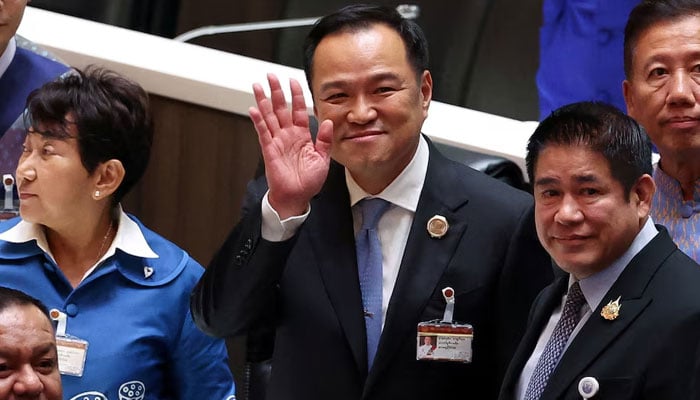Select Language:
Thailand’s Anutin Charnvirakul was chosen as the country’s new prime minister on Friday after easily winning a parliamentary vote. He defeated the candidate from the Shinawatra family’s once-powerful ruling party, bringing an end to a turbulent week marked by political chaos and deadlock.
Backed strongly by opposition forces, Anutin surpassed the minimum majority of votes needed in the lower house to assume the role of prime minister. His victory concluded several days of intense political maneuvering, during which he outperformed Thailand’s most historically successful political party.
A seasoned strategist, Anutin has maintained a prominent presence in Thai politics through years of instability. He has skillfully positioned his Bhumjaithai party as a key player among competing elite factions, ensuring its participation in various coalition governments.
His decisive defeat of competitor Chaikasem Nitisiri was particularly humiliating for Pheu Thai, the ruling party rooted in the populist movement of billionaire Thaksin Shinawatra. Thaksin left Thailand late Thursday and flew to Dubai, where he has spent most of his 15 years in self-imposed exile.
Anutin received about 63% of the votes, more than double that of Chaikasem. When leaving the parliamentary chamber, he was quickly surrounded by media, with aides pushing back journalists eager to get close as he moved toward his waiting car.
“I will work my hardest every day, without holidays, because there’s not much time,” Anutin said, flashing a bright smile amid the flashes of cameras.
“We need to resolve issues swiftly,” he added.
Pheu Thai’s crisis deepened in June after Anutin withdrew from its alliance, leaving the coalition government fragile with a slim majority amid protests and falling popularity. Last week’s court decision to dismiss Thaksin’s daughter and protégé, Paetongtarn Shinawatra, marked the sixth time a Thai prime minister tied to the Shinawatra family faced removal by military or judiciary.
Anutin’s rise was facilitated by a deal with the opposition’s main force, the People’s Party, which he persuaded with promises to hold a referendum on constitutional reform and schedule new elections within four months.
At 58, Anutin, the son of a former cabinet minister and previous construction business owner, has served as deputy prime minister, interior minister, and health minister, even leading Thailand’s COVID-19 response. Known for his conservative views and royalist stance, he gained notoriety for successfully campaigning to decriminalize cannabis, sparking a surge of marijuana outlets across the country.
He will lead a minority government, as the People’s Party has declined to join his administration. The country faces economic challenges, including sluggish consumer spending, tight credit, and rising household debt.
His ascension reflects a broader shift in Thai politics away from Thaksin’s influence and the decline of Pheu Thai, which previously won five of the last six elections but has lost support among working-class voters attracted by its populist promises.
Despite the setback, Pheu Thai has pledged to return to power and fulfill its goals. Thaksin’s sudden departure from Thailand on his private jet followed failed efforts by his party to dissolve the parliament and weaken Anutin’s coalition. A court ruling on Thaksin’s potential jailing is scheduled for next week.
Thaksin, who returned to Thailand in 2023 after serving an eight-year sentence for abuse of power, was transferred to a hospital on medical grounds during his first night in prison. His sentence was later reduced to one year by the king, and he was released on parole after six months. A court will decide if his hospital stay counts as time served; if not, he could be sent back to jail.
Thaksin posted on social media that he was in Dubai for medical checkups and to meet friends, and he plans to return to Thailand by September 8 for his court appearance.







